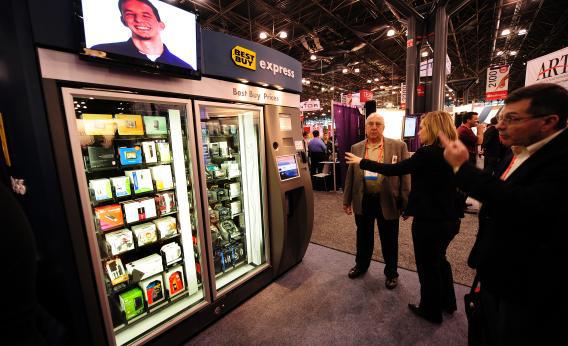Best Buy may be flailing, but confronted with vigorous competition from Amazon and other e-commerce retailers, it’s also bringing America a service Japanese customers have enjoyed for years: specialized, high-end vending machines. Japan is infamous for its vending machines for used skivvies, but in Japan they also use vending machines to sell live crabs, fried chicken, Buddhist amulets, porn, canned bread, sake, umbrellas, raw eggs, balloons, and even Smart Cars.
Slate held its annual company retreat this weekend, and driving back yesterday I saw something at a rest stop that showed American ingenuity is alive and well:
Along with iPads, the machine offered iPhone cases, phone-charging equipment, audio cables to use in the car, Beats by Dre headphones, and other gizmos that would be helpful if you’d forgotten something at home. The U.S. has been slow and snobbish in adopting this trend—lobster, caviar, and cupcakes—so it’s encouraging to see higher-end products marketed toward non-1-percenters. These “Best Buy Express” kiosks have been around since at least 2008, but mostly in airports—not off the New Jersey turnpike. ZoomSystems, the company that makes the kiosks, has created similar “automated stores” for Apple and the Body Shop.
One drawback of the system used to be* its draconian return policy, as described by Time’s Harry McCracken last year:
But Best Buy Express machines have a pretty hard-nosed return policy: you can return a gadget only if it’s unopened or defective, and then only by calling a toll-free number and waiting for a prepaid shipping label. Buyer’s remorse isn’t an adequate excuse. And as my receipt put it, “Items purchased through Best Buy Express(TM) MAY NOT be returned to Best Buy stores or through BestBuy.com.”
Targeting travelers at airports and rest stops is a smart move for Best Buy, and one place where it is actually more convenient than ordering its products off Amazon. There seems to be no markup compared with buying the goods on Best Buy’s website. No matter how efficient Amazon’s supply chain has become, the company hasn’t yet found a way to deliver products to customers who are en route. And there is somewhat inelastic demand for earbuds if you’ve left your pair at home and don’t want to listen to a screaming toddler for the duration of your six-hour flight.
Update: According to Best Buy spokesman Jon Sandler, “Customers who buy on the Best Buy kiosk can return in-store. This is new as of late spring/early summer.”
